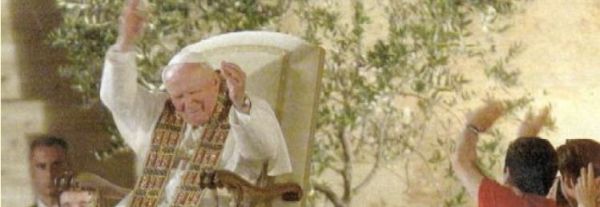And when he foretells to his disciples that persecution awaits them, with imprisonment and interrogation, he adds: "Do not worry about what you will have to say, but say what will be given you at that hour: for it is not you who speak, but the Holy Spirit" (Mk 13:11). "The Holy Spirit will teach you at that time what you have to say" (Lk 12, 12).
5. The synoptic Gospels record another statement by Jesus in his instructions to the disciples that cannot fail to impress. It concerns "blasphemy against the Holy Spirit". He says: "Whoever speaks against the Son of Man will be forgiven him, but whoever blasphemes the Holy Spirit will not be forgiven him" (Lk 12:10; cf. Mt 12:32; Mk 3:29). These words create a problem of greater theological and ethical magnitude than one might think, on the surface of the text. "Blasphemy" (of which we are speaking) does not really consist in offending the Holy Spirit with words; instead, it consists in refusing to accept the salvation that God offers to man through the Holy Spirit, and which works by virtue of the sacrifice of the cross. . If blasphemy against the Holy Spirit can be remitted neither in this life nor in the life to come, it is because this 'non-remission' is linked, as its cause, to 'non-penitence', that is, to the radical refusal to be converted . . . Now blasphemy against the Holy Spirit is the sin committed by man, who claims his supposed 'right' to persevere in evil - in any sin - and thus refuses redemption . . . (It) does not allow man to come out of his self-prison and open himself to the divine sources of purification of conscience and remission of sins' (Dominum et vivificantem, 46). This is the exact inversion of the condition of docility and communion with the Father, in which Jesus lives in prayer and action, and which he teaches and recommends to man as an inner attitude and as a principle of action.
6. In the whole of the preaching and action of Jesus Christ, which flows from his union with the Holy Spirit-Love, is contained an immense richness of heart: "Learn from me, who am meek and humble of heart," he exhorts, "and you will find rest for your souls" (Mt 11:29), but present at the same time is all the firmness of the truth about the kingdom of God, and therefore the insistent invitation to open one's heart, under the action of the Holy Spirit, to be admitted to it and not be excluded from it.
In all of this, the "power of the Holy Spirit" is revealed, and indeed the Holy Spirit Himself is manifested by His presence and action as the Paraclete, the comforter of man, the confirmer of divine truth, the eradicator of the "master of this world".
[Pope John Paul II, General Audience 25 July 1990]












